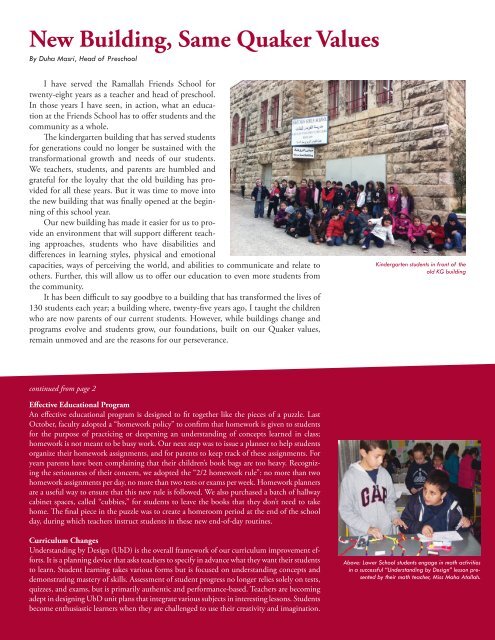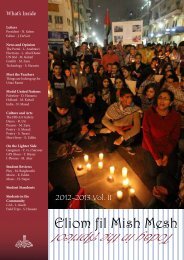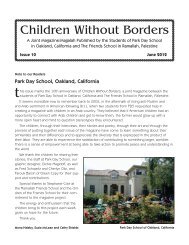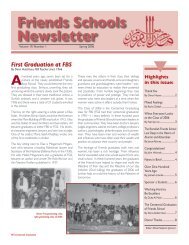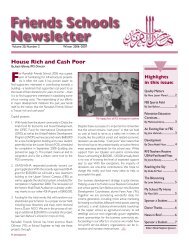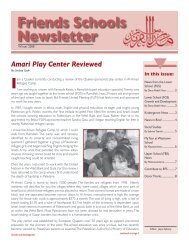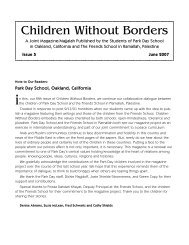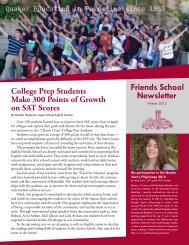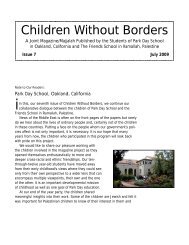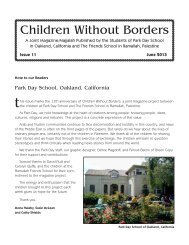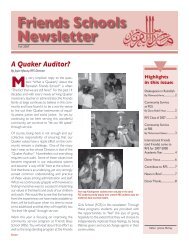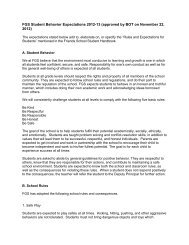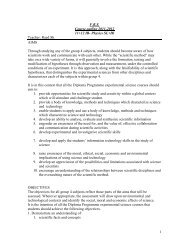Reason to Celebrate! - Ramallah Friends Schools
Reason to Celebrate! - Ramallah Friends Schools
Reason to Celebrate! - Ramallah Friends Schools
You also want an ePaper? Increase the reach of your titles
YUMPU automatically turns print PDFs into web optimized ePapers that Google loves.
New Building, Same Quaker Values<br />
By Duha Masri, Head of Preschool<br />
I have served the <strong>Ramallah</strong> <strong>Friends</strong> School for<br />
twenty-eight years as a teacher and head of preschool.<br />
In those years I have seen, in action, what an education<br />
at the <strong>Friends</strong> School has <strong>to</strong> offer students and the<br />
community as a whole.<br />
The kindergarten building that has served students<br />
for generations could no longer be sustained with the<br />
transformational growth and needs of our students.<br />
We teachers, students, and parents are humbled and<br />
grateful for the loyalty that the old building has provided<br />
for all these years. But it was time <strong>to</strong> move in<strong>to</strong><br />
the new building that was finally opened at the beginning<br />
of this school year.<br />
Our new building has made it easier for us <strong>to</strong> provide<br />
an environment that will support different teaching<br />
approaches, students who have disabilities and<br />
differences in learning styles, physical and emotional<br />
capacities, ways of perceiving the world, and abilities <strong>to</strong> communicate and relate <strong>to</strong><br />
others. Further, this will allow us <strong>to</strong> offer our education <strong>to</strong> even more students from<br />
the community.<br />
It has been difficult <strong>to</strong> say goodbye <strong>to</strong> a building that has transformed the lives of<br />
130 students each year; a building where, twenty-five years ago, I taught the children<br />
who are now parents of our current students. However, while buildings change and<br />
programs evolve and students grow, our foundations, built on our Quaker values,<br />
remain unmoved and are the reasons for our perseverance.<br />
Kindergarten students in front of the<br />
old KG building<br />
continued from page 2<br />
Effective Educational Program<br />
An effective educational program is designed <strong>to</strong> fit <strong>to</strong>gether like the pieces of a puzzle. Last<br />
Oc<strong>to</strong>ber, faculty adopted a “homework policy” <strong>to</strong> confirm that homework is given <strong>to</strong> students<br />
for the purpose of practicing or deepening an understanding of concepts learned in class;<br />
homework is not meant <strong>to</strong> be busy work. Our next step was <strong>to</strong> issue a planner <strong>to</strong> help students<br />
organize their homework assignments, and for parents <strong>to</strong> keep track of these assignments. For<br />
years parents have been complaining that their children’s book bags are <strong>to</strong>o heavy. Recognizing<br />
the seriousness of their concern, we adopted the “2/2 homework rule”: no more than two<br />
homework assignments per day, no more than two tests or exams per week. Homework planners<br />
are a useful way <strong>to</strong> ensure that this new rule is followed. We also purchased a batch of hallway<br />
cabinet spaces, called “cubbies,” for students <strong>to</strong> leave the books that they don’t need <strong>to</strong> take<br />
home. The final piece in the puzzle was <strong>to</strong> create a homeroom period at the end of the school<br />
day, during which teachers instruct students in these new end-of-day routines.<br />
Curriculum Changes<br />
Understanding by Design (UbD) is the overall framework of our curriculum improvement efforts.<br />
It is a planning device that asks teachers <strong>to</strong> specify in advance what they want their students<br />
<strong>to</strong> learn. Student learning takes various forms but is focused on understanding concepts and<br />
demonstrating mastery of skills. Assessment of student progress no longer relies solely on tests,<br />
quizzes, and exams, but is primarily authentic and performance-based. Teachers are becoming<br />
adept in designing UbD unit plans that integrate various subjects in interesting lessons. Students<br />
become enthusiastic learners when they are challenged <strong>to</strong> use their creativity and imagination.<br />
Above: Lower School students engage in math activities<br />
in a successful “Understanding by Design” lesson presented<br />
by their math teacher, Miss Maha Atallah.


